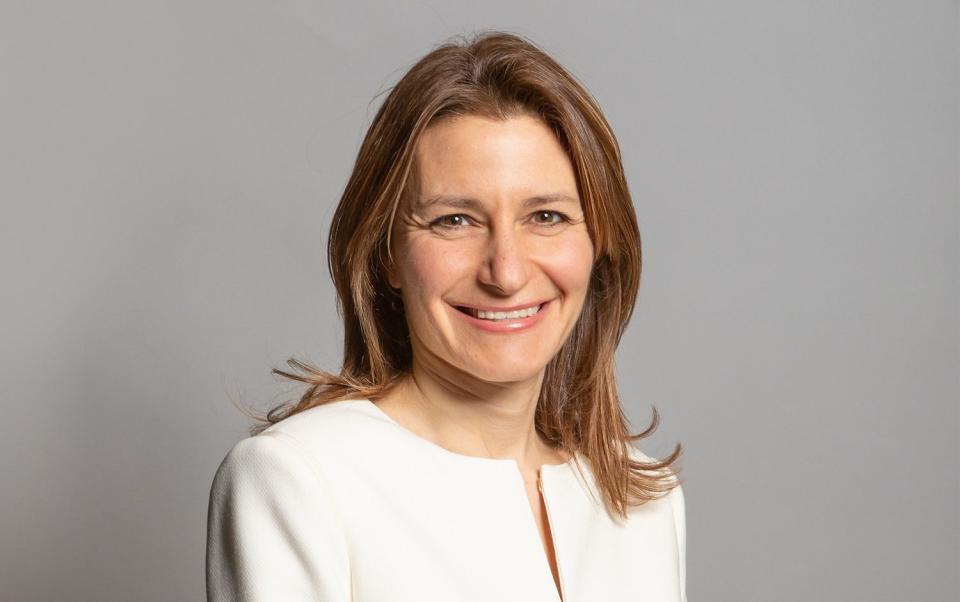Strip judges of court case listing powers to prevent criminals ‘clogging up justice’, says minister

Judges should be stripped of timetabling powers to speed up justice, says a senior minister.
In an exclusive article for The Telegraph, Lucy Frazer, financial secretary to the Treasury and a former solicitor general and justice minister, said it was “unacceptable” that victims were not getting “timely redress” and having to wait up to two-and-a-half years for justice in rape and other crimes.
She said many more criminals could be brought to justice if they appeared before courts more quickly and blockages caused by listing delays due to witnesses or lawyers failing to turn up and the double booking of cases were removed.
She said switching responsibility for timetabling cases from judges to the Ministry of Justice (MoJ) would allow the deployment of AI technology to better manage the task of identifying cases at risk of delays and provide the judiciary with the administrative backup to corral lawyers and witnesses.
MoJ figures show that, for all crimes, victims are having to wait on average more than 240 days from the point their case is referred to the crown court to its completion. For rape, it takes on average two years from a victim reporting the offence to the judge giving their verdict.
Ms Frazer is the latest minister to spell out concerns about issues outside her brief - although she is a barrister, former courts, legal aid and prisons minister, was solicitor general and said she had been a victim of crime. Ministers have felt freer to give their views in the interval before a new prime minister.
Many defendants wait until the last minute to plead guilty
Writing in a personal capacity, she contrasted the hopes of a rape victim to have her feelings of violation, shame and guilt eased by her attacker being brought to justice, with the chances of this happening in a timely way.
“What she doesn’t realise as she makes her police statement is that she has a three per cent chance of her case being prosecuted. And a two per cent chance of a conviction. And that even if she falls within the two per cent, she may have to wait two-and-a-half years for her outcome,” she said.
She accepted there were no easy answers or quick fixes but said: “Fixing the system, speeding up justice, bringing criminals to face justice can and must be done. It is simply unacceptable that victims do not get timely redress.”
Ms Frazer, a former barrister, said it was critical to speed up the time taken to get the alleged offender into court as many criminals deliberately delayed their plea until the last minute.
“In approximately 65 to 70 per cent of crown court cases the defendant pleads guilty. This means no trial is ever needed,” she said.
“The defendant often waits until the last moment - the court door - to do this and given the delays in awaiting a trial date the current system allows the perpetrator additional years of freedom before conviction. Clogging up justice.
“Why can’t we bring this date forward? Why can’t we collect the evidence earlier, engage earlier with the defence team and have that trial date fixed much sooner? Just imagine how many more criminals could be brought to justice at the right time."
'We need to introduce technology, including AI'
Ms Frazer accepted that judges “fiercely” guarded their right to list hearings as part of the separation of powers that politicians should not be involved in judicial judgements.
But she said it needed to be “radically overhauled, completely reconsidered and responsibility re-thought”.
“We need to introduce smarter systems, introduce technology including AI. This could be used to manage the court case load much more effectively,” she said.
“It can be the case that more trials are vacated [don’t take place] in a month than go ahead. AI could be used to predict this better. Imagine how much court time has been lost and how many criminals could have been brought to justice earlier.
“We need to front load cases and bring them before the court at the earliest opportunity. And then we need a proper system to effectively manage them and understand how to swiftly fill the gaps where cases fall away. Handing control and oversight to the Ministry of Justice will allow a better coordination of all parts of the justice system.”
It's time to speed up justice for the sake of victims
This week a teenage girl was raped and another sexually assaulted in a park in East Chingford, and a 13-year-old girl was raped in Sheffield, writes Lucy Frazer, MP for South East Cambridgeshire.
These are just a few of the approximately 70,000 women and girls every year who report rape to the police. That’s one rape reported every seven minutes.
When a victim walks through that police station door she hopes for justice. She hopes that those feelings of violation, shame and guilt will be eased when her perpetrator is punished.
What she doesn’t realise as she makes her police statement is that she has a three per cent chance of her case being prosecuted. And a two per cent chance of a conviction. And that even if she falls within the two per cent, she may have to wait two-and-a-half years for the outcome.
Whilst the statistics are different for other crimes, the reality is that across the board, justice can be slow. The reasons for this are very complicated. Gathering the evidence to prove a case, and bringing it to trial in circumstances where a perpetrator is likely to welcome prevarication, has challenges.

Having seen the justice system from every angle - as a barrister, solicitor general, minister for courts, prisons, legal aid and unfortunately as a victim, I know that those working within the system are dedicated and hardworking. That they care deeply about delivering justice. And it would be wrong to suggest that there are easy answers and quick fixes.
But fixing the system, speeding up justice, bringing criminals to face justice can and must be done. It is simply unacceptable that victims do not get timely redress.
We must grip these cases earlier; much, much earlier. And whilst much has been done in recent times by ministers across government, the CPS and the police, there is a solution staring us in the face.
In approximately 65 to 70 per cent of crown court cases the defendant pleads guilty. This means no trial is ever needed.
The defendant often waits until the last moment - the court door - to do this and given the delays in awaiting a trial date the current system allows the perpetrator additional years of freedom before conviction. Clogging up justice.
Why can’t we bring this date forward? Why can’t we collect the evidence earlier, engage earlier with the defence team and have that trial date fixed much sooner? Just imagine how many more criminals could be brought to justice at the right time.
Which brings me on to a fundamental issue at the moment in the justice system: the listing of cases for trial. The current responsibility for listing these cases for hearing lies with the judiciary. They fiercely guard this responsibility. And there is good reason for this - that is the separation of powers - that politicians should not be involved in judicial judgments.
But the fixing of a court hearing is not a judicial decision. Our judges are rightly internationally respected, revered and brilliant. But this does not mean that they need to be responsible for, or may necessarily be the best at functional administration.
The listing of cases needs to be radically overhauled, completely reconsidered and responsibility re-thought. We need to introduce smarter systems, introduce technology including AI. This could be used to manage the court case load much more effectively.
It can be the case that more trials are vacated (i.e. don’t take place) in a month than go ahead. AI could be used to predict this better. Imagine how much court time has been lost and how many criminals could have been brought to justice earlier.
We need to front load cases and bring them before the court at the earliest opportunity. And then we need a proper system to effectively manage them and understand how to swiftly fill the gaps where cases fall away. Handing control and oversight to the Ministry of Justice will allow a better co-ordination of all parts of the justice system.
This is fundamental to the running of our courts system. It will make significant strides in improving the outcomes for victims. It will bring closure earlier to those who need it. It will ensure trust and faith in our world renowned justice systems.
Criminals who commit crimes will pay for them at the earliest opportunity. If we could bring these changes forward we could help all those trusting in our justice system every seven minutes. And I would urge our leadership candidates, both of whom I know care deeply about our justice system, to consider taking these critical steps, if elected.


